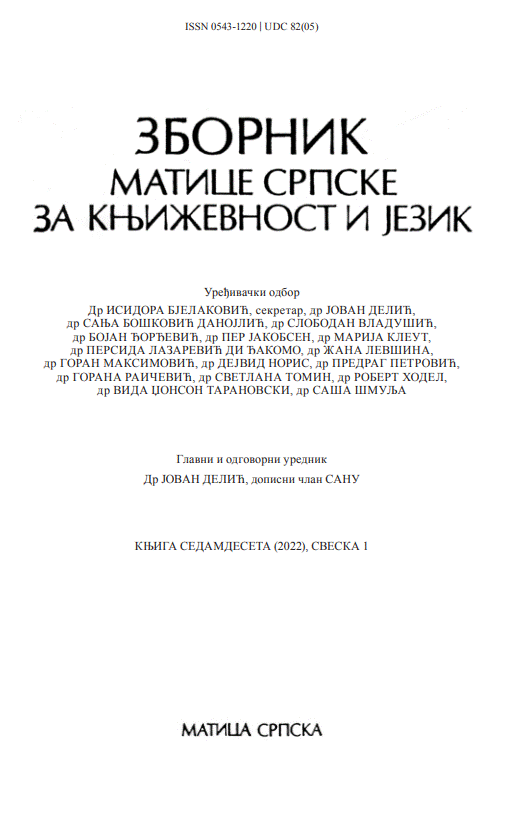ДУХ КОСОВА У УСМЕНОМ ЕПСКОМ НАРАТИВУ О ЈЕЛЕНИ БАЛШИЋ
THE SPIRIT OF KOSOVO IN ORAL EPIC NARRATIVE ABOUT JELENA BALŠIĆ
Author(s): Rosanda V. BajovićSubject(s): Language and Literature Studies, Literary Texts
Published by: Матица српска
Summary/Abstract: The oral epic tradition about Kosovo is the key to the understanding of the semantics of the narrative about Jelena Balšić, historical and epical daughter of prince Lazar and love of Miloš Obilić. It is also a frame for understanding facts that the Jelena Balšić is the only member of the ruler house Balšić who has oral traditions left, as well as that she is the founder of Crnojević house, but not only them. The oldest saved oral tradition about Jelena Balšić being a founder is a historically unconfirmable tradition about her being the founder of Koprivica lineage from Banjani. There is an intentional motive about foundling in the oral tradition about the origin of the Koprivica family, which is adapted to newer conditions – that is in terms of the spirit of Kosovo’s tradition. The oral traditions are not the only thing that is Kosovo oriented about Jelena Balšić, she is also confused and alternated with queen Jelena Anžujska with whom the Zeta’s princess, alongside with the name and ruling of Zeta with her son, socioculturally connected by ktitor work and literature. The difference is understandable if we know that the Jelena Anžujska ruled over Zeta, the part of the Raška and Trebinje region before the Battle of Kosovo. The oral narrative about Jelena Balšić has more value as a testimony of Kosovo tradition in space and time than aesthetic value. Epic biography of Jelena Balšić is primarily is a mark of love, that is love–widow of Miloš Obilić who after the Battle of Kosovo marries the ruler of Ključ, ruler of Zeta and ruler of Kotor – depending on the theme of an individual decasyllabic epic poem and prosaic oral traditions. The oral tradition chose Jelena, the daughter of Prince Lazar, as the love of Miloš Oblilić despite her being the real wife of two historical rulers, Zeta’s prince Đurađ Stracimirović Balšić and Bosnian duke Sandalj Hranić Kosača. In the 117 background of that stands the cult of Prince Lazar, but also the personality of the historical character of Jelena Balšić. The oral epic narrative about Jelena Balšić is a reflection of the battle on Kosovo and her role in historical reality. Epical marriage of Jelena Balšić and prince’s epic knight Miloš Obilić, which has attributes from its historical character is more in the balance with Obilić’s character from Kosovo’s epics than with her historical husbands, and we interpret that as a mark of epical justice. Vuk’s oral epics do not insist that Miloš Obilić is the brother–in–law of Prince Lazar, which distances him from the narrative about the fight between the daughters and brothers–in–law of prince Lazar whose fight resulted in the defeat of the Battle of Kosovo. Diferencia spesifica of the oral narrative about Jelena Balšić in regards to the Story about the Battle on Kosovo is in the literary mark of Miloš Obilić as a brother in law of Prince Lazar in a way that follows the spiritual dimension of Vuk’s oral poetry about Kosovo as a center of Serbian oral epics. On the other side, oral tradition about Jelena Balšić is on the metatextual level and in regards to Vuk’s epic poems about Kosovo, achieved by perceiving the post–Kosovo reality from Kosovo’s perspective – in a way which does not mention Vuk Branković as an epic betrayer and highlights Jelena Balšić as a Kosovo’s widow
Journal: Зборник Матице српске за књижевност и језик
- Issue Year: 70/2022
- Issue No: 1
- Page Range: 87-118
- Page Count: 32
- Language: Serbian

